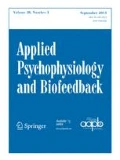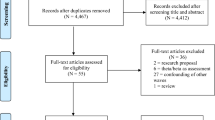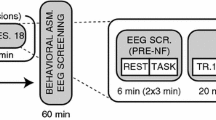Abstract
Attention plays an important role in children’s development and learning, and neurofeedback training (NFT) has been proposed as a promising method to improve attention, mainly in population with attention problems such as attention deficit hyperactivity disorder. However, whether this approach has a positive effect on attention in normal developing children has been rarely investigated. This pilot study conducted ten sessions of alpha/theta ratio (ATR) NFT on eight primary students in school environment, with two to three sessions per week. The results showed inter-individual difference in NFT learning efficacy that was assessed by the slope of ATR over training sessions. In addition, the attention performance was significantly improved after NFT. Importantly, the improvement of attention performance was positively correlated with the NFT learning efficacy. It thus highlighted the need for optimizing ATR NFT protocol for the benefits on attention at the individual level. Future work can employ a double-blind placebo-controlled design with larger sample size to validate the benefits of ATR NFT for attention in normal developing children.




Similar content being viewed by others
Data Availability
The data that support the findings of this study are available from the corresponding author upon reasonable request.
References
Alkoby, O., Abu-Rmileh, A., Shriki, O., & Todder, D. (2018). Can we predict who will respond to neurofeedback? A review of the inefficacy problem and existing predictors for successful EEG neurofeedback learning. Neuroscience, 378, 155–164. https://doi.org/10.1016/j.neuroscience.2016.12.050
Bluschke, A., Broschwitz, F., Kohl, S., Roessner, V., & Beste, C. (2016). The neuronal mechanisms underlying improvement of impulsivity in ADHD by theta/beta neurofeedback. Scientific Reports, 6, 31178. https://doi.org/10.1038/srep31178
Cai, D., Deng, M., Yu, J., Nan, W., & Leung, A. W. S. (2021). The relationship of resting-state EEG oscillations to executive functions in middle childhood. International Journal of Psychophysiology, 164, 64–70. https://doi.org/10.1016/j.ijpsycho.2021.02.021
Clayton, M. S., Yeung, N., & Cohen Kadosh, R. (2019). Electrical stimulation of alpha oscillations stabilizes performance on visual attention tasks. Journal of Experimental Psychology: General, 148(2), 203–220. https://doi.org/10.1037/xge0000502
Dobrakowski, P., & Lebecka, G. (2020). Individualized neurofeedback training may help achieve long-term improvement of working memory in children with ADHD. Clinical EEG and Neuroscience, 51(2), 94–101. https://doi.org/10.1177/1550059419879020
Domingos, C., Peralta, M., Prazeres, P., Nan, W., Rosa, A., & Pereira, J. G. (2021). Session frequency matters in neurofeedback training of athletes. Applied Psychophysiology and Biofeedback, 46(2), 195–204. https://doi.org/10.1007/s10484-021-09505-3
Englert, C., & Bertrams, A. (2015). Integrating attentional control theory and the strength model of self-control. Frontiers in Psychology. https://doi.org/10.3389/fpsyg.2015.00824
Gelade, K., Janssen, T. W. P., Bink, M., Twisk, J. W. R., van Mourik, R., Maras, A., & Oosterlaan, J. (2018). A 6-month follow-up of an RCT on behavioral and neurocognitive effects of neurofeedback in children with ADHD. European Child & Adolescent Psychiatry, 27(5), 581–593. https://doi.org/10.1007/s00787-017-1072-1
Gnecchi, J. A. G., Herrera García, J. C., & de Dios Ortiz Alvarado, J. (2007). Auxiliary neurofeedback system for diagnostic of attention deficit hyperactivity disorder. The Electronics, Robotics and Automotive Mechanics Conference. https://doi.org/10.1109/CERMA.2007.4367674
Gruzelier, J. H. (2014). EEG-neurofeedback for optimising performance. I: A review of cognitive and affective outcome in healthy participants. Neuroscience and Biobehavioral Reviews, 44, 124–141. https://doi.org/10.1016/j.neubiorev.2013.09.015
Gruzelier, J. H., Foks, M., Steffert, T., Chen, M. J. L., & Ros, T. (2014). Beneficial outcome from EEG-neurofeedback on creative music performance, attention and well-being in school children. Biological Psychology, 95, 86–95. https://doi.org/10.1016/j.biopsycho.2013.04.005
Hillard, B., El-Baz, A. S., Sears, L., Tasman, A., & Sokhadze, E. M. (2013). Neurofeedback training aimed to improve focused attention and alertness in children with ADHD: A study of relative power of EEG rhythms using custom-made software application. Clinical EEG and Neuroscience, 44(3), 193–202. https://doi.org/10.1177/1550059412458262
Hsueh, J. J., Chen, T. S., Chen, J. J., & Shaw, F. Z. (2016). Neurofeedback training of EEG alpha rhythm enhances episodic and working memory. Human Brain Mapping, 37(7), 2662–2675. https://doi.org/10.1002/hbm.23201
Huang, J., Yu, C., Wang, Y., Zhao, Y., Liu, S., Mo, C., & Shi, Y. (2014). FOCUS: Enhancing Children’s engagement in reading by using contextual BCI training sessions. Proceedings of the SIGCHI Conference on Human Factors in Computing Systems. https://doi.org/10.1145/2556288.2557339
Janssen, T. W., Bink, M., Gelade, K., van Mourik, R., Maras, A., & Oosterlaan, J. (2016). A randomized controlled trial into the effects of neurofeedback, methylphenidate, and physical activity on EEG power spectra in children with ADHD. Journal of Child Psychology and Psychiatry, 57(5), 633–644. https://doi.org/10.1111/jcpp.12517
Kadosh, K. C., & Staunton, G. (2019). A systematic review of the psychological factors that influence neurofeedback learning outcomes. Neuroimage, 185, 545–555. https://doi.org/10.1016/j.neuroimage.2018.10.021
Klimesch, W. (2012). Alpha-band oscillations, attention, and controlled access to stored information. Trends in Cognitive Sciences, 16(12), 606–617. https://doi.org/10.1016/j.tics.2012.10.007
Kober, S. E., Witte, M., Ninaus, M., Neuper, C., & Wood, G. (2013). Learning to modulate one’s own brain activity: The effect of spontaneous mental strategies. Frontiers in Human Neuroscience, 7, 695. https://doi.org/10.3389/fnhum.2013.00695
Luijmes, R. E., Pouwels, S., & Boonman, J. (2016). The effectiveness of neurofeedback on cognitive functioning in patients with Alzheimer’s disease: Preliminary results. Neurophysiologie Clinique, 46(3), 179–187. https://doi.org/10.1016/j.neucli.2016.05.069
Lutsyuk, N. V., Éismont, E. V., & Pavlenko, V. B. (2006). Modulation of attention in healthy children using a course of eeg-feedback sessions. Neurophysiology, 38.
Mohagheghi, A., Amiri, S., Moghaddasi Bonab, N., Chalabianloo, G., Noorazar, S. G., Tabatabaei, S. M., & Farhang, S. (2017). A randomized trial of comparing the efficacy of two neurofeedback protocols for treatment of clinical and cognitive symptoms of ADHD: Theta suppression/beta enhancement and theta suppression/alpha enhancement. BioMed Research International, 2017, 3513281. https://doi.org/10.1155/2017/3513281
Moin, N., Asadi Gandomani, R., & Amiri, M. (2018). The effect of neurofeedback on improving executive functions in children with attention deficit/hyperactivity disorder. Journal of Rehabilitation, 19(3), 220–227. https://doi.org/10.32598/rj.19.3.220
Nan, W., Rodrigues, J. P., Ma, J., Qu, X., Wan, F., Mak, P. I., & Rosa, A. (2012). Individual alpha neurofeedback training effect on short term memory. International Journal of Psychophysiology, 86(1), 83–87. https://doi.org/10.1016/j.ijpsycho.2012.07.182
Nan, W., Wan, F., Lou, C. I., Vai, M. I., & Rosa, A. (2013). Peripheral visual performance enhancement by neurofeedback training. Applied Psychophysiology and Biofeedback, 38(4), 285–291. https://doi.org/10.1007/s10484-013-9233-6
Nan, W., Wan, F., Tang, Q., Wong, C. M., Wang, B., & Rosa, A. (2018). Eyes-closed resting EEG predicts the learning of alpha down-regulation in neurofeedback training. Frontiers in Psychology, 9, 1607. https://doi.org/10.3389/fpsyg.2018.01607
Nan, W., Wan, F., Vai, M. I., & Da Rosa, A. C. (2015). Resting and initial beta amplitudes predict learning ability in beta/theta ratio neurofeedback training in healthy young adults. Frontiers in Human Neuroscience, 9, 677. https://doi.org/10.3389/fnhum.2015.00677
Nicholson, A. A., Ros, T., Densmore, M., Frewen, P. A., Neufeld, R. W. J., Théberge, J., & Lanius, R. A. (2020). A randomized, controlled trial of alpha-rhythm eeg neurofeedback in posttraumatic stress disorder: A preliminary investigation showing evidence of decreased PTSD symptoms and restored default mode and salience network connectivity using fMRI. NeuroImage: Clinical. https://doi.org/10.1016/j.nicl.2020.102490
Ninaus, M., Kober, S. E., Witte, M., Koschutnig, K., Neuper, C., & Wood, G. (2015). Brain volumetry and self-regulation of brain activity relevant for neurofeedback. Biological Psychology, 110, 126–133. https://doi.org/10.1016/j.biopsycho.2015.07.009
Ogrim, G., Kropotov, J., & Hestad, K. (2012). The quantitative EEG theta/beta ratio in attention deficit/hyperactivity disorder and normal controls: Sensitivity, specificity, and behavioral correlates. Psychiatry Research, 198(3), 482–488. https://doi.org/10.1016/j.psychres.2011.12.041
Peng, W., Zhan, Y., Jiang, Y., Nan, W., Kadosh, R. C., & Wan, F. (2020). Individual variation in alpha neurofeedback training efficacy predicts pain modulation. Neuroimage Clin, 28, 102454. https://doi.org/10.1016/j.nicl.2020.102454
Ros, T., Kwiek, J., Andriot, T., Michela, A., Vuilleumier, P., Garibotto, V., & Ginovart, N. (2020). PET imaging of dopamine neurotransmission during EEG neurofeedback. Frontiers in Physiology, 11, 590503. https://doi.org/10.3389/fphys.2020.590503
Ros, T., Moseley, M. J., Bloom, P. A., Benjamin, L., Parkinson, L. A., & Gruzelier, J. H. (2009). Optimizing microsurgical skills with EEG neurofeedback. BMC Neuroscience, 10, 87. https://doi.org/10.1186/1471-2202-10-87
Shereena, E. A., Gupta, R. K., Bennett, C. N., Sagar, K. J. V., & Rajeswaran, J. (2019). EEG neurofeedback training in children with attention deficit/hyperactivity disorder: A cognitive and behavioral outcome study. Clinical EEG and Neuroscience, 50(4), 242–255. https://doi.org/10.1177/1550059418813034
Shin, M.-S., Jeon, H., Kim, M., Hwang, T., Oh, S. J., Hwangbo, M., & Kim, K. J. (2015). Effects of smart-tablet-based neurofeedback training on cognitive function in children with attention problems. Journal of Child Neurology, 31(6), 750–760. https://doi.org/10.1177/0883073815620677
Sitaram, R., Ros, T., Stoeckel, L., Haller, S., Scharnowski, F., Lewis-Peacock, J., & Sulzer, J. (2017). Closed-loop brain training: The science of neurofeedback. Nature Reviews Neuroscience, 18(2), 86–100. https://doi.org/10.1038/nrn.2016.164
Steingrimsson, S., Bilonic, G., Ekelund, A. C., Larson, T., Stadig, I., Svensson, M., & Bernhardsson, S. (2020). Electroencephalography-based neurofeedback as treatment for post-traumatic stress disorder: A systematic review and meta-analysis. European Psychiatry, 63(1), e7. https://doi.org/10.1192/j.eurpsy.2019.7
Thomas, B. L., & Viljoen, M. (2016). EEG brain wave activity at rest and during evoked attention in children with attention-deficit/hyperactivity disorder and effects of methylphenidate. Neuropsychobiology, 73(1), 16–22. https://doi.org/10.1159/000441523
Van Doren, J., Arns, M., Heinrich, H., Vollebregt, M. A., & Strehl, U. (2019). Sustained effects of neurofeedback in ADHD: A systematic review and meta-analysis. European Child and Adolescent Psychiatry, 28(3), 293–305. https://doi.org/10.1007/s00787-018-1121-4
Van Doren, J., Heinrich, H., Bezold, M., Reuter, N., Kratz, O., Horndasch, S., Berking, M., Ros, T., Gevensleben, H., Moll, G. H., & Studer, P. (2017). Theta/beta neurofeedback in children with ADHD: Feasibility of a short-term setting and plasticity effects. International Journal of Psychophysiology, 112, 80–88. https://doi.org/10.1016/j.ijpsycho.2016.11.004
Vernon, D. J. (2005). Can neurofeedback training enhance performance? An evaluation of the evidence with implications for future research. Applied Psychophysiology and Biofeedback, 30(4), 347–364. https://doi.org/10.1007/s10484-005-8421-4
Vink, M., & Jolles, J. (1985). A new version of the Trail-Making Test as an information processing task. Journal of Clinical and Experimental Neuropsychology, 7(2), 162.
Wan, F., Nan, W., Vai, M. I., & Rosa, A. (2014). Resting alpha activity predicts learning ability in alpha neurofeedback. Frontiers in Human Neuroscience, 8, 500. https://doi.org/10.3389/fnhum.2014.0050
Wang, S., Zhang, D., Fang, B., Liu, X., Yan, G., Sui, G., Huang, Q., Sun, L., & Wang, S. (2021). A study on resting EEG effective connectivity difference before and after neurofeedback for children with ADHD. Neuroscience, 457, 103–113. https://doi.org/10.1016/j.neuroscience.2020.12.038
Witte, M., Kober, S. E., Ninaus, M., Neuper, C., & Wood, G. (2013). Control beliefs can predict the ability to up-regulate sensorimotor rhythm during neurofeedback training. Frontiers in Human Neuroscience, 7, 478. https://doi.org/10.3389/fnhum.2013.00478
Zoefel, B., Huster, R. J., & Herrmann, C. S. (2011). Neurofeedback training of the upper alpha frequency band in EEG improves cognitive performance. NeuroImage, 54(2), 1427–1431. https://doi.org/10.1016/j.neuroimage.2010.08.078
Acknowledgements
This work was supported in part by the National Natural Science Foundation of China [Grant Numbers 81901830, 31600906], the Humanities and Social Science Fund of Ministry of Education of China [Grant Number 19YJC190018], the General Project of Education Science by Shanghai Philosophy and Social Sciences [Grant Number A2021002], Shuguang Program supported by Shanghai Education Development Foundation, Shanghai Municipal Education Commission [Grant Number 20SG45], the Science and Technology Development Fund, Macau SAR (Grant Numbers 055/2015/A2 and 0045/2019/AFJ) and the University of Macau Research Committee (MYRG projects 2016-00240-FST and 2017-00207-FST). The authors thank the great support of this research from the teachers and students of Quyang No.4 Primary School in Hongkou District of Shanghai.
Author information
Authors and Affiliations
Corresponding author
Ethics declarations
Conflict of interest
All authors declare that they have no conflict of interest.
Ethical Approval
All procedures performed in the current study were in accordance with the ethical standards of the institutional and/or national research committee and with the 1964 Helsinki declaration and its later amendments or comparable ethical standards. This article does not contain any studies with animals performed by any of the authors.
Informed Consent
Informed consent was obtained from all individual participants included in the study.
Additional information
Publisher's Note
Springer Nature remains neutral with regard to jurisdictional claims in published maps and institutional affiliations.
Supplementary Information
Below is the link to the electronic supplementary material.
Rights and permissions
About this article
Cite this article
Nan, W., Wan, M., Jiang, Y. et al. Alpha/Theta Ratio Neurofeedback Training for Attention Enhancement in Normal Developing Children: A Brief Report. Appl Psychophysiol Biofeedback 47, 223–229 (2022). https://doi.org/10.1007/s10484-022-09550-6
Accepted:
Published:
Issue Date:
DOI: https://doi.org/10.1007/s10484-022-09550-6




